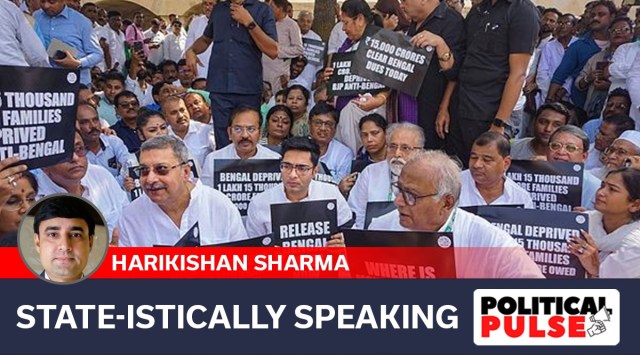Harikishan Sharma, Senior Assistant Editor at The Indian Express' National Bureau, specializes in reporting on governance, policy, and data. He covers the Prime Minister’s Office and pivotal central ministries, such as the Ministry of Agriculture & Farmers’ Welfare, Ministry of Cooperation, Ministry of Consumer Affairs, Food and Public Distribution, Ministry of Rural Development, and Ministry of Jal Shakti. His work primarily revolves around reporting and policy analysis. In addition to this, he authors a weekly column titled "STATE-ISTICALLY SPEAKING," which is prominently featured on The Indian Express website. In this column, he immerses readers in narratives deeply rooted in socio-economic, political, and electoral data, providing insightful perspectives on these critical aspects of governance and society. ... Read More
TMC protest: Bengal at top in terms of demand for two schemes over which Centre funds stopped
In terms of number of families availing MNREGS, Bengal stood first in country in 2015-16, at 61 lakh; for this year, the figure so far is 7,598; similarly PMAY-G numbers in state plunged from 5.89 lakh in 2017-18 to 1.47 lakh in 2022-23
 TMC General Secretary Abhishek Banerjee along with party leaders during their protest against BJP-led Central government over alleged apathy towards Bengal, in New Delhi. (PTI)
TMC General Secretary Abhishek Banerjee along with party leaders during their protest against BJP-led Central government over alleged apathy towards Bengal, in New Delhi. (PTI) AS THE Trinamool Congress holds a protest in Delhi over the Centre stopping release of funds under Union government schemes to West Bengal, ferrying hundreds of leaders and workers from the state for the purpose, official data shows that for two of the schemes in question, Bengal was at the top in demand.
As per the data, 51-80 lakh families availed the MNREGS, which guarantees 100 days of work in rural areas per family, annually between 2014-15 and 2021-22. In terms of number of families, this meant that West Bengal stood first among all states and Union Territories in 2015-16; second on five occasions – 2014-15, 2016-17, 2017-18, 2020-21 and 2021-22 – third in 2019-20; and fourth in 2018-19.
In case of the Pradhan Mantri Awaas Yojana-Gramin (PMAY-G) too, for which Central funds are stopped, West Bengal was a better performer compared to other states.
The data available on the MNREGS portal shows that the number of households employed under the MNREGS stood at 51 lakh in 2014-15, rose to 61 lakh in 2015-16, dipped for three consecutive years – 58 lakh in 2016-17, 52 lakh in 2017-18 and 43.89 lakh in 2018-19 – before rising to 54.57 lakh in 2019-20, 79.64 lakh in 2020-21, and 75.97 lakh in 2021-22 (overlapping with the Covid pandemic years, when the demand for MNREGS shot up).
After the Centre invoked Section 27 of the MNREG Act, 2005, and stopped the release of funds to the state in March 2022, the number of families seeking work under the scheme plunged. It stood at 16.29 lakh in 2022-23,and only 7,598 in the ongoing financial year of 2023-24. (See the graph.)
 The number of households who availed the NREGS (Express graphic)
The number of households who availed the NREGS (Express graphic)
Corresponding data available on the dashboard of PMAY-G, which was launched in April 2016, shows that the number of rural houses built under the scheme in West Bengal stood at 5.89 lakh in 2017-18, 7.39 lakh in 2018-19, 2.86 lakh in 2019-20, 6.78 lakh in 2020-21, and 9.59 lakh in 2021-22. Amidst the Centre stopping the release of funds to West Bengal under the PMAY-G, the number came down to 1.47 lakh in 2022-23.
The Centre has alleged siphoning off of money allotted to the MNREGS in West Bengal as the reason for stopping the funds, and sent a monitoring team to investigate. The monitoring team’s report has not been made public, though the Union Ministry of Rural Development continues to insist that the TMC government did not take any action on it.
In a statement on Monday, as the TMC began its Delhi protest, Union Rural Development Minister Giriraj Singh alleged that the West Bengal government issued 25 lakh fake MNREGS job cards, through which crores of government funds were siphoned. He also alleged that the West Bengal government was not cooperating with the Centre in the investigation.
“The Union minister said … that the Government of India was continuously exposing the rigging in the MGNREGA and housing schemes going on in West Bengal, but the state government failed to take appropriate action on it,” said the statement issued by the Ministry.
The statement further said, “The Central government also sent a monitoring team, but no timely action was taken on their report by the state government… The state was asked by the ministry on several occasions to submit a comprehensive action-taken report (ATR), but no action was taken… Finally, the state was informed that non-submission of ATR on time could also lead to withholding of funds under MGNREG Act, 2005. After this, an ATR report, protecting the culprits, was presented by the state government. When questions were asked, the state government was also unable to answer on the issues of corruption.”
The number of job cards issued under the MNREGS in West Bengal stood at 1.37 crore as on October 2, 2023, of which 0.93 crore job cards were active. The number of total MNREGS workers stood at 2.57 crore, of whom 1.39 crore were active. Of the total active workers, 28.52% belonged to Scheduled Castes and 8.01% to Scheduled Tribes. In 2014-22, West Bengal accounted for between 8% and 13% of the total families who availed the MNREGS in the country.
On the PMAY-G, the Rural Development Minister said that complaints were received about the state government changing the name of the Central scheme to ‘Bangla Awas Yojana’. “Apart from this, eligible families were deprived of houses and party workers were allotted houses in violation of the guidelines… The loss that the West Bengal government has caused to the poor by denying their rights can prove to be harmful for the country in the future,” the statement said.
“That is why the government allocated the target of 11.3 lakh houses under Awas-Plus on the condition that the state will allot houses only to the eligible families following the guidelines of the scheme, but again several complaints were received from many MPs and MLAs, and the general public, regarding serious irregularities in the implementation of the scheme including selection of ineligible families by the West Bengal government. In light of this, ATR was demanded from the state government, but proper explanation was not given,” the statement said.
While officials in the Ministry of Rural Development Ministry refused to share the details of the dues pending to West Bengal, Trinamool Congress leaders put the figures at Rs 4,000 crore for the Bangla Awas Yojana, Rs 930 crore for a road scheme, and Rs 7,000 crore for the MNREGS.
As per the MNREG Act, the Centre may give directions it may consider necessary to the state government for the effective implementation of the programme.
“The Central government may, on receipt of any complaint regarding the issue or improper utilisation of funds granted under this Act, in respect of any scheme, if prima facie satisfied that there is a case, cause an investigation into the complaint made by any agency… and if necessary, order stoppage of release of funds to the scheme and institute appropriate remedial measures for its proper implementation within a reasonable period of time,” the Act states.





- 01
- 02
- 03
- 04
- 05



























